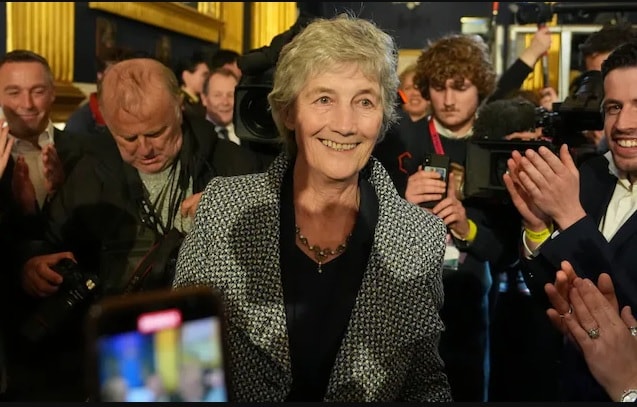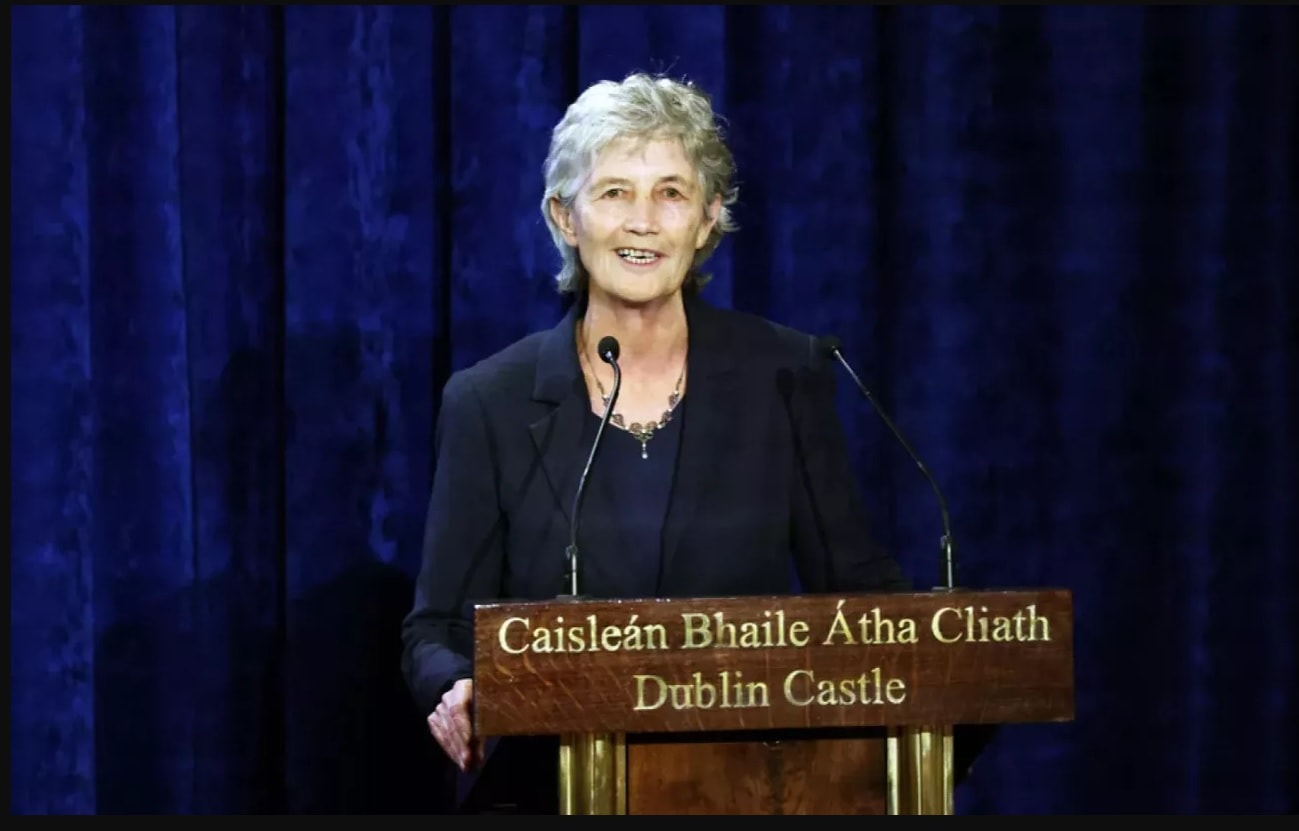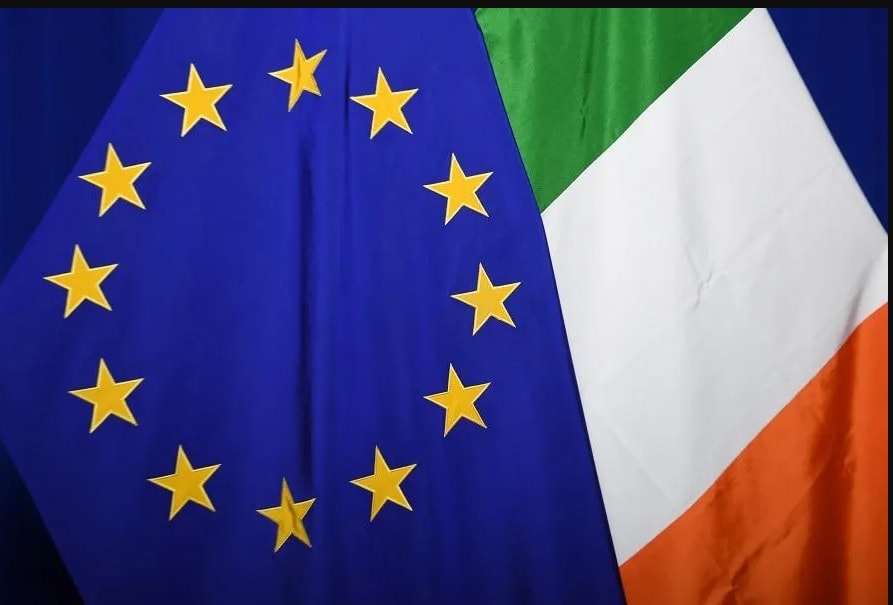Ireland's new President Catherine Connolly: A symbol of tolerance.
Catherine Connolly's resounding victory in the 2025 Irish presidential election made her the third female president in the country's history. With 63% of the vote, she achieved a personal feat, while also embodying the aspirations for change of the Irish working class, who still see her as "a symbol of tolerance."
The Journey of Compassion
Born in the port city of Galway, in Western Ireland, Catherine Connolly grew up in a community home with 13 siblings. She once said that her most vivid childhood memory wasn't poverty, but "the feeling of a community that never left anyone behind." When she was just nine years old, her mother died, and her father had to work tirelessly in a shipyard to support his young children. Growing up in such circumstances, Connolly quickly understood that survival required not only willpower but also compassion – qualities that would later become guiding principles in her political career.

After graduating from university with a degree in clinical psychology and then earning a law degree, Catherine Connolly worked for many years as a lawyer, defending vulnerable people in housing and labor disputes. Her years in Galway gave her a close-up view of the widening gap between rich and poor – an injustice that the Irish welfare system has yet to bridge. In 1999, Catherine Connolly entered politics when she was elected a Labour Party member of the Galway City Council. Just five years later, she became the city's first female mayor – the first from a working-class background to hold this position. But as the Labour Party gradually shifted toward a centrist stance, supporting budget cuts, she left the party in 2007 to pursue independence – a bold decision at the time. In the eyes of her colleagues, behind the gentle exterior of a compassionate woman, Catherine Connolly is a very determined politician. She rarely compromises on what she considers wrong, and in a way that “she may lose votes, but she will never lose her principles.” It was this steadfastness that helped Connolly gradually build the image of a politician close to the people, one who was willing to stand in the street and listen to homeless people talk about their last meal of the day, instead of just giving speeches in auditoriums.
In 2016, Catherine Connolly won a parliamentary seat for Galway West as an independent candidate. She was re-elected repeatedly and was elected Deputy Speaker of the House of Commons in 2020 – the first woman in history to hold this position. In the 2025 presidential campaign, Catherine Connolly was not considered a "heavyweight" candidate, as her opponent was former Minister Heather Humphreys, who was backed by the center-right Fine Gael party. But Connolly turned the unexpected into reality. She traveled to small towns, holding community meetings, speaking about topics that resonated with voters, such as housing, the cost of living, peace, and the right to be heard. Irish media called it a "campaign of trust," where the 68-year-old woman, without a large political apparatus, won millions of hearts with her sincerity. When the results were announced at Dublin Castle, Catherine Connolly stepped out before the crowd, a gentle smile on her face, and pledged to be a tolerant president, a voice for peace, and a defender of Ireland's tradition of neutrality.

TheEuropean caution
While Catherine Connolly's victory was unexpected, her style on the international stage was even more noteworthy. Unlike most European leaders who are trying to project consensus on defense and foreign policy, Connolly chose a different approach: she doesn't believe in military solutions and doesn't hesitate to criticize the EU for deviating from its own Enlightenment values. Amidst European debates about military aid, responsibilities within the North Atlantic Treaty Organization (NATO), and stances on conflicts like Ukraine and Israel-Palestine, Catherine Connolly stands out as an independent voice – one so blunt it's controversial. She has openly condemned Israel's actions in Gaza, criticized the European Union for its "militarization" since the Russia-Ukraine conflict, and even argued that the EU is "losing its soul" by pursuing increased defense spending instead of investing in dialogue and welfare. She also compared the current armament trend to Europe in the 1930s – a comparison that Brussels found "not very comfortable." Nevertheless, European diplomats had to acknowledge that Catherine Connolly's blunt statements touched upon the most thorny issue facing the EU today: the need to strengthen common defense and the neutrality of some nations like Ireland, Austria, and Malta.

Therefore, in Brussels, the reaction to Catherine Connolly's victory was twofold. On the one hand, EU officials publicly congratulated her and praised "Ireland's strong democratic traditions." But in internal discussions, policymakers expressed concern that the new president's statements could affect the bloc's image of unity, especially as the EU prepares for a common defense plan for 2026-2030. One EU official shared that Ireland remains an important part of the Union, but if Connolly continues to publicly criticize Europe's militarization programs, the EU will have to find ways to maintain a consistent message at the bloc level. In fact, immediately after Catherine Connolly's election, the European Commission sent official congratulations, but also emphasized that the EU "respects Ireland's neutrality while continuing to encourage all members to contribute to collective security." This diplomatic approach reflects the delicate balance Brussels is trying to maintain. Although, during her seven-year term, Connolly will not have direct involvement in Ireland's foreign policy, Irish political history shows that presidents wield significant influence over public opinion and the thinking of voters – who shape subsequent elections. With her prestige, Connolly could foster support for a more independent Ireland in its foreign policy stance, while simultaneously restoring the belief that humanitarian values remain fundamental to European politics. In fact, Catherine Connolly's bluntness might make European diplomats wary, but domestically it reinforces her image as a "guardian of Ireland's neutrality." During her campaign, she affirmed her commitment to defending the rule that only allows the Irish military to participate in international missions with the approval of the United Nations, the government, and parliament. She also called for a referendum if the government wanted to change this principle – a move seen as a direct challenge to Ireland's pro-European stance. These views helped Connolly appeal to younger voters who had lost faith in traditional parties.
It could be said that, in the calculating world of politics, the frankness and tolerance of Ireland's new president are a rare find. While the future may place limits on the role of a president who is essentially ceremonial, Catherine Connolly is still bringing to Ireland something every nation desires: the belief that politics can still be built on compassion.



